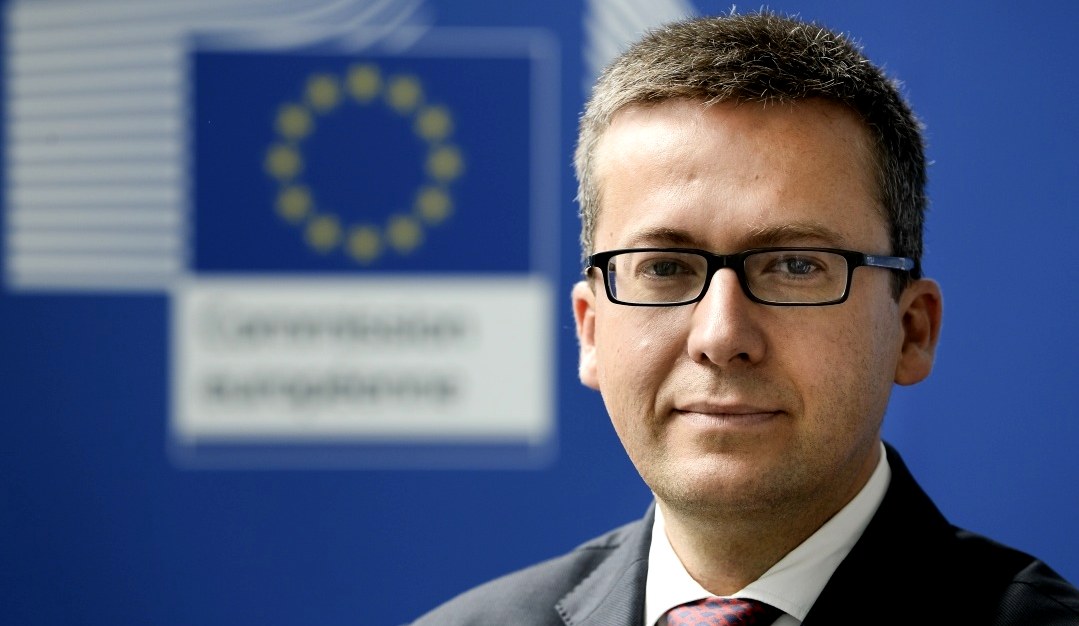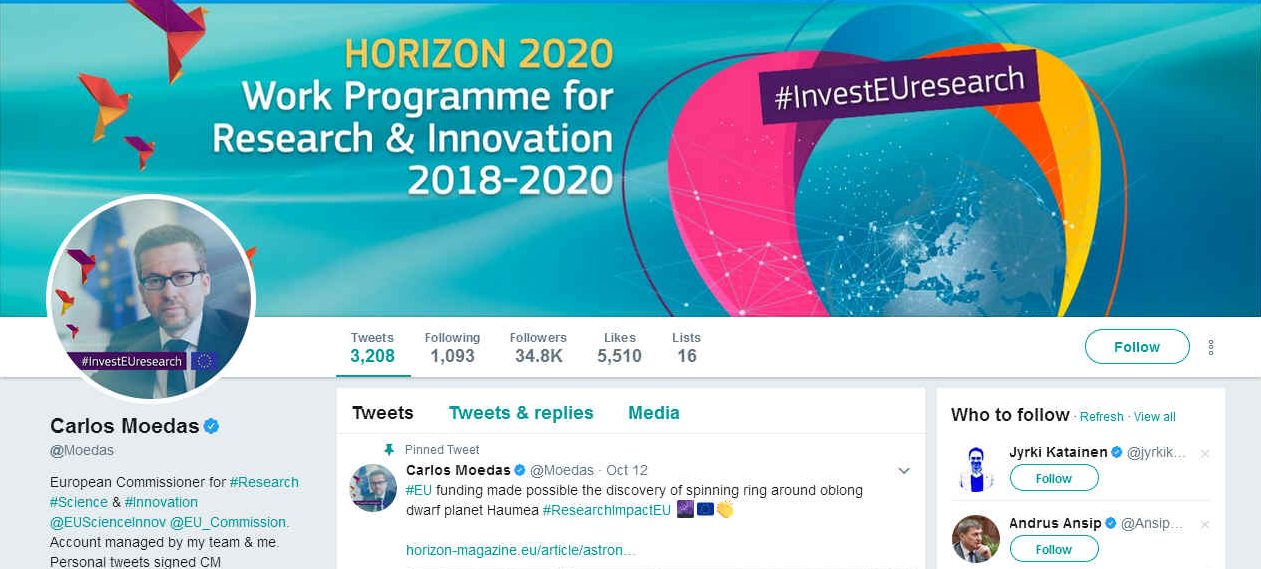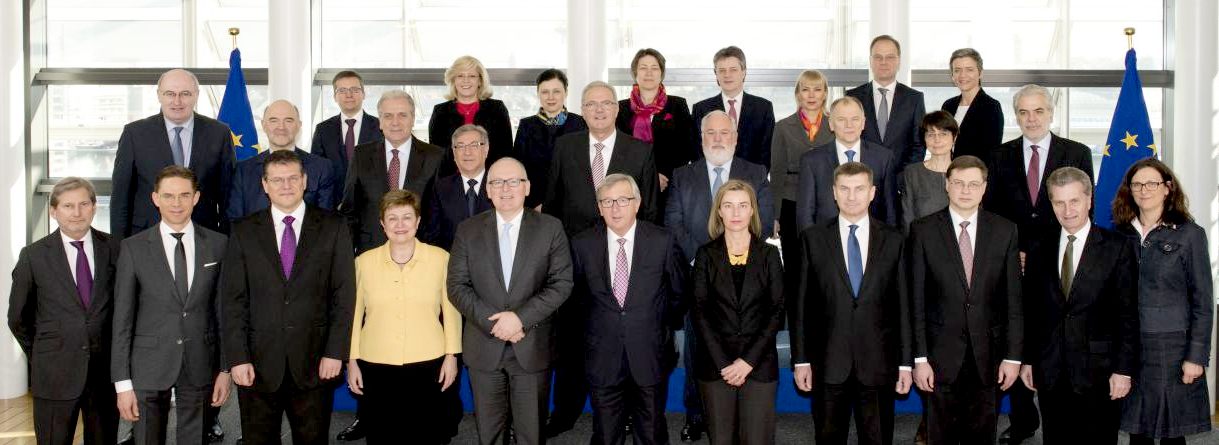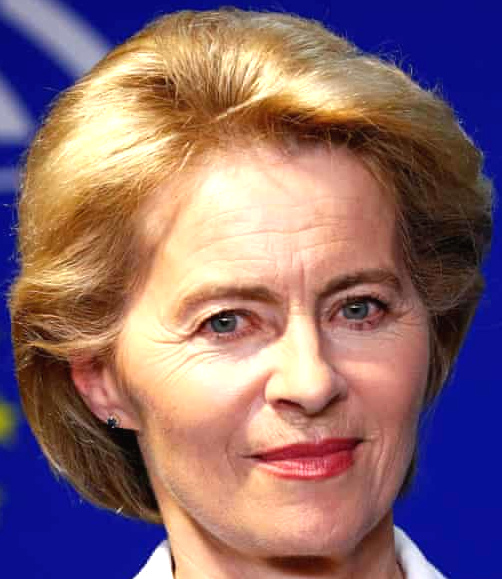|
CARLOS
MOEDAS
ABOUT -
CLIMATE CHANGE
- FOUNDATION -
HOME - OCEAN PLASTIC
- UN
Please
use our A-Z INDEX
to navigate this site

COMMISSIONER
- Carlos
Moedas
Carlos Moedas is the European Commissioner for Research, Science and Innovation.
He was born in Beja (Portugal) in 1970. He graduated in Civil Engineering from the Higher Technical Institute (IST) in 1993 and completed his final year of studies at the École Nationale des Ponts et Chaussées in
Paris. After obtaining an MBA from Harvard Business School (USA) in 2000, he returned to
Europe to work in mergers and acquisitions at the investment bank Goldman Sachs in
London (UK). He returned to Portugal in 2004 as Managing Director of Aguirre Newman and member of the Executive Board of Aguirre Newman in
Spain. In 2008, he founded his own investment company, Crimson Investment management. Three years later he was elected for the National Parliament and was called for the government to Secretary of State to the Prime Minister of
Portugal in charge of the Portuguese Adjustment Programme.
In 2014, Pedro Passos Coelho, Prime Minister of Portugal, nominated him as European Commissioner, and Moedas' name was approved by EC President-elect Jean-Claude Juncker on 1 September. On 1 November 2014, Moedas became European Commissioner for Research, Science and Innovation. Following a reshuffle of the Juncker Commission in 2016, he was offered the post of European Commissioner for Digital Economy and Society but eventually declined. In 2014, Moedas finally became member of the
European
Commission.
SPEECH
- OPEN INNOVATION, OPEN SCIENCE, OPEN TO THE WORLD - 22 June 2015
Carlos Moedas – Commissioner for Research, Science and Innovation
Brussels, ‘A new start for Europe: Opening up to an ERA of Innovation’ Conference
On 25 April this year, an earthquake of magnitude 7.3 hit Nepal. To get real-time geographical information, the response teams used an online mapping tool called Open Street Map. Open Street Map has created an entire online map of the world using local knowledge, GPS tracks and donated sources, all provided on a voluntary basis. It is open license for any use.
Open Street Map was created by a 24 year-old computer science student at University College London in 2004, has today 2 million users and has been used for many digital humanitarian and commercial purposes: From the earthquakes in Haiti and Nepal to the Ebola outbreak in West Africa.
This story is one of many that demonstrate that we are moving into a world of open innovation and user innovation. A world where the digital and physical are coming together. A world where new knowledge is created through global collaborations involving thousands of people from across the world and from all walks of life.
Ladies and gentlemen, over the next two days I would like us to chart a new path for European research and innovation policy. A new strategy that is fit for purpose for a world that is open, digital and global. And I would like to set out at the start of this important conference my own ambitions for the coming years.
But first, I'd like to take a moment to look back at how far we've come.When we started this journey 15 years ago, the European Research Area was conceived as a physical space. We therefore focused on the physical cooperation and mobility of researchers in different countries, and the flow of knowledge across national borders. If we stand back from the detailed policy discussions and look at the bigger picture, we will see just how much progress has been made.
Cross-border research cooperation has become a wonderful, every-day reality. Mobility is also becoming a normal part of the career of every researcher. Around one in three EU researchers have been internationally mobile over the last 10 years. There has been an eight-fold increase in the number of jobs advertised on the EURAXESS site since 2007, with around 10 000 job offers on any given day. Today, we have a single, integrated European programme for research and innovation.
So, now is the time to complete this first chapter of the ERA and Innovation Union. Let us take the final steps. I am working with universities and research institutes to launch the new RESAVER pension scheme by this time next year. This will allow researchers to move more easily between Member States.
In June next year I will convene a meeting with all countries who have introduced national ERA action plans, to complete this first chapter.
At the same time, we must also open the next chapter. The first chapter was about the physical ERA and bringing together research and innovation. The next chapter must focus on opening up our research and innovation systems and bringing together the physical and digital.
Let me then turn to the challenges ahead. As the new Commissioner for Research, Science and Innovation, I have spent the last eight months listening, visiting Member States, looking at the evidence, developing my own views.
I see fantastic strengths in Europe. We are open, we have diversity, we host great institutions. With Horizon 2020, we are funding research on an unprecedented scale. But we must be honest about the challenges we face.
I see three major challenges:
We are too rarely succeeding in getting research results to market. Technologies developed in Europe are most of the time commercialised elsewhere.
Although Europe generates more scientific output than any other region in the world, in some areas we fall behind on the very best science. At the same time, there is a revolution happening in the way science works. Every part of the scientific method is becoming an open, collaborative and participative process.
Europe punches below its weight in international science and science diplomacy. Our collective scientific importance should be matched by a more active voice in global debates.
So, In order to overcome these three challenges I see three strategic priorities:
* Open Innovation,
* Open Science, and
* Openness to the World.
So what do I mean exactly?
Let's start with Open Innovation!
Open innovation is about involving far more actors in the innovation process, from researchers, to entrepreneurs, to users, to governments and civil society. We need open innovation to capitalise on the results of European research and innovation. This means creating the right ecosystems, increasing investment, and bringing more companies and regions into the knowledge economy. I would like to go further and faster towards open innovation.
First, I believe we need to do more to create a regulatory environment for innovation to flourish. How do we make sure that legislative processes that take several years can adapt to technologies that evolve every month? How do we make sure that regulation is based on an innovation principle as well as a precautionary principle?
Second, if we compare the investment levels between the EU and the US one of the biggest differences in the ecosystem is venture capital. There is far less venture capital in Europe, and venture capital funds do not have the scale or scope to grow companies from early stage to mid-cap and from mid-cap to global players.
I would like to address this problem head on through the development of one or several European Fund of Funds that will invest in new generations of great European innovative companies
Third, we need new actions to get more innovation impact out of Horizon 2020. One way we can do this is to create real synergies with the Structural Funds.
Together with Commissioner Cretu, I plan to introduce a "seal of excellence" for applicants that are evaluated as excellent but cannot obtain financing from Horizon 2020, to help them access Structural Funds. This will start with applicants to the SME instrument.
This will allow regions to support their most promising companies – those companies that are recognized as excellent at European level.
Fourth, Horizon 2020 has made a huge step forward in supporting innovation. I am very proud of this. But I also see that Europe does not yet have a world class scheme to support the very best innovations in the way that the European Research Council is the global reference for supporting excellent science.
So I would like us to take stock of the various schemes to support innovation and SMEs under Horizon 2020, to look at best practice internationally, and to design a new European Innovation Council. This is not for tomorrow, but I believe we should discuss it as a major element under the mid term review of Horizon 2020.
Then there's Open Science which is the theme of today's discussions!
I am convinced that excellent science is the foundation of future prosperity, and that openness is the key to excellence. We are often told that it takes many decades for scientific breakthroughs to find commercial application.
Let me tell you a story which shows the opposite. Graphene was first isolated in the laboratory by Profs. Geim and Novoselov at the University of Manchester in 2003 (Nobel Prizes 2010). The development of graphene has since benefitted from major EU support, including ERC grants for Profs. Geim and Novoselov. So I am proud to show you one of the new graphene products that will soon be available on the market.
This light bulb uses the unique thermal dissipation properties of graphene to achieve greater energy efficiencies and a longer lifetime that
LED bulbs. It was developed by a spin out company from the University of Manchester, called Graphene Lighting, as is expected to go on sale by the end of the year.
But we must not be complacent. If we look at indicators of the most excellent science, we find that Europe is not top of the rankings in certain areas. Our ultimate goal should always be to promote excellence not only through ERC and Marie Skłodowska-Curie but throughout the entire H2020.
For such an objective we have to move forward on two fronts:
First, we are preparing a call for European Science Cloud Project in order to identify the possibility of creating a cloud for our scientists. We need more open access to research results and the underlying data. Open access publication is already a requirement under Horizon 2020, but we now need to look seriously at open data.
This will mean setting standards for the management, interoperability and quality of scientific data. I would like to see progress on this in next 12 months. And I will want to see what further support or requirements for open data should be introduced in Horizon 2020 following the mid term review.
Second, I strongly believe that the time has come for a European initiative on research integrity. This will be a subject of one of the sessions tomorrow and I would like to see the discussion including policy makers, research funders, research institutions and researchers themselves.
Indeed I think we should launch a new European Research Integrity Initiative – with clear standards and mechanisms to tackle scientific misconduct – by the end of this year.
This will not only boost scientific excellence, but it will show to the public that European science is above reproach.
Finally we need to be Open to the World!
Europe is a global leader in science, and this should translate into a leading voice in global debates. To remain relevant and competitive, we need to engage more in science diplomacy and global scientific collaboration. It is not sufficient to only support collaborative projects; we need to enable partnerships between regions and countries.
Challenges in areas like energy, health, food and water are global challenges. And Europe should be leading the way in developing global research partnerships to address these challenges. This means speaking with one voice, and close coordination with Member States' international collaborations. The example of the EDCTP initiative shows that we can do it.
But I would like to go much further and begin building a global research area. This will not happen in one step, but through developing partnerships with other areas, such as China, Latin America and the
United
States. As a first step, we announced two weeks ago the creation of a Common Research Area at the Academic Summit of Heads of State and Government of the European Union and the Community of Latin America and Caribbean States. I would like to take a similar step next Monday, when I co-chair the EU
China Innovation Cooperation Dialogue.
So, during my mandate I commit myself to launch and expand a series of international initiatives.
Let me give some examples:
1. I will work with Latin America and African partners to launch a common research strategy for the South Atlantic, mirroring what has been done for the North Atlantic under the Galway initiative.
2. I am working with Member State and partner governments to launch the PRIMA initiative as a joint research programme on water and food for the Mediterranean region.
3.
We should invest more in projects like the SESAME initiative in Jordan that enables researchers from across this region to work together on world class science.
This conference is our opportunity to complete the current ERA and Innovation Union actions and to move forward confidently towards open innovation, open science and open to the world. This new InnovationERA must be based on actions and not words. I have mentioned a few examples today, but there are no doubt other possibilities and better ideas.
We should not be afraid of testing new ideas and piloting new actions [Drew Faust the Dean of Harvard always tells students: "A key part of any success is the part of you that is willing to fail"] . But we then must have the discipline to stop those which are not working, and the ambition to scale up what works. Research and innovation must take a long term perspective and not be trapped by the past. And we must make sure that each one of our actions brings in new entrants, young researchers, dynamic entrepreneurs, and people who have never been involved in European research and innovation.
This isn't just another Commission conference.
This is your chance to feed your ideas and aspirations into this new strategy. We will find out soon enough what works and what doesn't and we will build on our successes together.
When innovators like LEGO start fusing real bricks with digital magic, when citizens conduct their own R&D through online community projects, when doctors start printing live tissues for patients … Policymakers must follow suit.
We owe it to the European Citizens.
We owe it to the future generations.
Let's dare to make Europe open to innovation, open to science and open to the world.
SPEECH/15/524
EU
RESPONSIBILITIES
Making sure that research funding programmes, notably Horizon 2020, contribute to the Commission's jobs, growth and investment package.
Promoting the international excellence of the EU's research and science and strengthening research capacities and innovation across all Member States.
Evaluating how EU‑funded research can be used more effectively.
Ensuring that Commission proposals are based on scientific evidence.
Encouraging private companies to apply research to meet challenges faced by society and create more high-quality jobs.

Carlos
Moedas is part of the following Project Teams:
*
Jobs,
Growth, Investment and Competitiveness
*
Euro
and Social Dialogue
*
Digital
Single Market
*
Energy
Union
*
Better
Regulation and Interinstitutional Affairs
*
Budget
and Human Resources
ABOUT
THE EU
The
European Union established a
Commission to act as their
executive and to promote its general interests. The Commission is composed of the College of Commissioners
comprised of 28 members, including the President and Vice-Presidents. The Commissioners, one from each EU country, are the Commission's political leadership during a 5-year term. Each Commissioner is assigned responsibility for specific policy areas by the President.

THE
COMMISSION
- Group photograph of the European Commissioners in 2017.
LINKS
& REFERENCE
https://www.euro-fusion.org/newsletter/carlos-moedas/
https://en.wikipedia.org/wiki/Carlos_Moedas
https://twitter.com/Moedas
Role
Project
team
Name
http://ec.europa.eu/maritimeaffairs/maritimeday/
https://ec.europa.eu/commission/commissioners/2014-2019_en
This
website is provided on a free basis as a public information
service. copyright © Cleaner
Oceans Foundation Ltd (COFL) (Company No: 4674774)
2022. Solar
Studios, BN271RF, United Kingdom.
COFL
is a charity without share capital. The names AmphiMax™,
RiverVax™
and SeaVax™
are trade names used under license by COF in connection with their 'Feed
The World' ocean cleaning sustainability campaign.
|





























